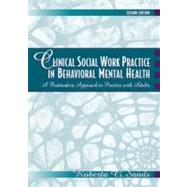
Most chapters conclude with “Summary and Deconstruction.”
1. Getting Oriented: Themes and Context.
From Community Mental Health to Behavioral Health.
Research-Informed Practice.
Definitional Issues.
Postmodernism.
I. FRAMEWORK FOR PRACTICE.
2. Historical Context.
Colonial Period.
Beginnings of Psychiatry in the United States.
Nineteenth Century.
The Reform Movement in the Early Years of the Twentieth Century.
World War I and Its Aftermath.
The 1930s and 1940s.
World War II and Its Aftermath.
Changing Approaches to Mental Health Treatment: 1950-1980.
Changes in Mental Health Policies: 1981-2000.
Deconstructing the Text.
3. A Biopsychosocial Conceptual Framework.
Biological Knowing.
Psychological Knowing.
Social Environmental Knowing.
Integrating Biological, Psychological, and Social Ways of Knowing.
4. The Biopsychosocial Assessment.
Components of a Comprehensive Interdisciplinary Assessment.
Assessing the Client's Psychiatric Symptoms.
Thinking about the Biopsychosocial Assessment.
Writing a Biopsychosocial Summary.
Case Review with an Interdisciplinary Team.
5. Legal and Ethical Issues.
Involuntary Civil Commitment.
Least Restrictive Alternative.
Clients' Rights.
Confidentiality and the Duty to Warn.
Ethical Issues Surrounding Behavioral Managed Care.
6. Postmodern and Feminist Theory and Practice.
Postmodern Feminism in Context.
Postmodern Feminism Meets Psychological Theories.
The Construction of Women as Mentally Ill.
Looking at the Context: Problematic Relationships.
Other Ways of Healing.
7. Racial, Ethnic, and Cultural Issues.
Definitions.
History of Oppression.
Multiple Contexts.
Ethnicity and Mental Health Help Seeking.
Cultural Dimensions of the DSM-IV Diagnosis and Treatment.
Clinical Social Work Practice with Specific Ethnic Groups.
II. INTERVENTION.
8. Clinical Practice with Depressed Clients.
Description of Major Depression and Dysthymia.
Multiple Dimensions.
Medication.
Best Practice: Interpersonal Therapy.
Best Practice: Cognitive or Cognitive-Behavioral Therapy.
Instruments Used to Assess and Monitor Depression.
Other Ways of Healing.
9. Clinical Practice with Clients and Anxiety Disorders.
Types of Anxiety Disorders.
Explanatory Theories.
Medications Used to Treat Anxiety Disorders.
Cognitive-Behavioral Treatment of Anxiety Disorders.
Best Practice: Cognitive-Behavioral Treatment for Panic Disorder and Panic Disorder with Agoraphobia.
Case Example: Integrated Methods.
Instruments Used to Assess and Monitor Anxiety.
Other Ways of Healing.
10. Intervention with Persons with Severe Mental Illness: Theories, Concepts, and Philosophies.
Definitional Issues.
Theoretical Issues.
Expressed Emotion.
Psychosocial/Psychiatric Rehabilitation.
Community Support Programs and Systems.
Best Practices.
Instruments Used to Assess and Monitor Severe Mental Illness.
11. Community Care of Persons with Severe Mental Illness: Case Management and Community Resources.
Case Scenario.
Case Management and Community Care.
Assumptions Underlying Case Management/Community Care Practice.
Community Support Services and Resources.
12. Intervention with Individuals Affected by Severe Mental Illness: Medication, Social Skills Training, and Family Education.
Medication.
Best Practice: Social Skills Training.
Intervening with the Family.
Other Ways of Healing.
13. Clinical Practice with Clients Who Abuse Substances.
Substances of Abuse.
Definitions of Psychoactive Drug Problems.
Etiologic Theories of Substance Abuse Disorders.
Psychosocial Assessment and Treatment of Substance Use Disorders.
Dual Diagnoses.
Treating Clients with Chemical Dependency and Dual Disorders in the Era of Managed Care.
The Effectiveness of Treatment for Chemical Dependency and Dual Diagnoses.
The New copy of this book will include any supplemental materials advertised. Please check the title of the book to determine if it should include any access cards, study guides, lab manuals, CDs, etc.
The Used, Rental and eBook copies of this book are not guaranteed to include any supplemental materials. Typically, only the book itself is included. This is true even if the title states it includes any access cards, study guides, lab manuals, CDs, etc.